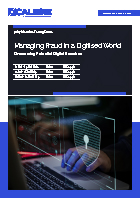| Date | Venue | Fee | |
|---|---|---|---|
| 13 Jul - 17 Jul 2026 | Dubai – UAE | $ 5,950 | Register Now |
| 19 Oct - 23 Oct 2026 | Dubai – UAE | $ 5,950 | Register Now |
About the Course
Fraud, Theft, and Corruption in the workplace are arguably the most underestimated problems and, therefore, the most unmanaged risks in business. As individuals and organisations, we are cashing in on the 'digital dividend' with ever-increasing enthusiasm. However, there is a price to be paid for these newfound freedoms, and we aren't paying it.
With every digital freedom, we create exposures and vulnerabilities. Sometimes, the technology needs more time to be ready for the task at hand because the human user still needs to adjust to the different types of risks they face online. As a result, online fraud, targeting any transaction that can generate cash, is being perpetrated by clever but unscrupulous criminals who see the digital world as a huge opportunity to make money.
This 5-day interactive Managing Fraud in a Digitalised World training course is designed to discuss how Regulatory Technology (RegTech) and work processes play a part in managing digital fraud. It highlights every organisation's and individual's challenges in the exponentially growing digital world. Looking at all areas that can be affected by technology, the programme will highlight the cyber risks now faced by the world and innovative methods to protect us against them.
Core Objectives
By the end of this training course, delegates will be able to:
- Appreciate the role of RegTech
- Identify & understand Fraud, who commits it and why
- Analyse smart devices and use them safely and effectively
- Ensure that IT and Computer Systems are effectively monitored
- Understand the digital underground
- Know how organised crime hacks the systems
- Learn about emerging digital protection techniques
Training Approach
Delegates in this training course will receive comprehensive instruction through proven adult learning and facilitation techniques with highly interactive and participative training methodology, including case studies, exercises, and role-plays to simulate real audit scenarios and situations commonly encountered by auditing, compliance, and quality assurance professionals.
The Attendees
Digital transactions and processes continue to grow; therefore, it is vital to mitigate digital fraud proactively. This training course is helpful for anyone dealing with digital operations and systems.
Likewise, it will be valuable to the professionals but not limited to the following:
- Fraud Investigators and Specialists
- Security Officers
- Professionals working in Auditing, Compliance, and Quality Assurance
- Managers need a broader understanding of how to investigate digital types of fraud
- Professionals who are using technology for business
- Members of the Fraud Team who need to learn more about targeting digital types of fraud
- Professionals in Support Functions, such as HR, Finance, and Legal
- Professionals needing a broader understanding of how organised crime will attack their business
Daily Discussion
DAY ONE: THE NATURE OF FRAUD
- What is Fraud?
- Who Commits Fraud?
- The Fraud Components Triangle
- Fraud in the Digital World
- What can we do?
- Regulatory Technology
DAY TWO: CONNECTED TECHNOLOGIES
- Smartphones
- Emails and the Cloud
- Computers and Laptops
- Internal Systems
- Fraud and Dangers in the Home
DAY THREE: THE DIGITAL UNDERGROUND
- Organised Crime
- The Malware-Industrial Complex
- The Onion Router (TOR)
- Bitcoin: Legal Currency or a Money Laundering Tool?
- Exploring What Can Be Found on the Dark Web
DAY FOUR: INCREASED CONNECTIVITY AND HACKING
- All Things are Hackable
- Hacking Biometrics
- Everything Connected – Insecurely
- Loss of Privacy
- Hacking Your Home and Business
DAY FIVE: STRATEGY AND KEY ELEMENTS
- Review Standards: ISO 9001, ISO 27001, and ISO 15489
- Creating an Information and Documentation Audit
- Create File Plans, Metadata Plans, Retention Schedules, and Other Information Controls
- The Way Forward: Users
- Encryption
Certificate Awarded
Upon successful completion of this training course, participants will be awarded a Certificate of Completion from XCalibre Training Centre, acknowledging their accomplishment. This certificate serves as a testament to their dedication to developing their skills and advancing their expertise in their respective fields.



